They thought she was a senior.
Her matted coat covered in tangles, scabs, wounds, and mange told them she was an older gal. The sorrow in her eyes screamed she went through a lot.
Katie’s whole behaviour yelled at the world that she needed a break from everything. She was so tired of constantly being rejected, hurt, and not worthy.
Just when she thought she had gone even further than rock bottom, an angel saviour showed up. All hopes weren’t lost after all.
Rocky Kanaka jumped in, once again, and saved this lost soul.
This is a story you have to read.
This is Katie’s story.
Hiding In The Corner, Scared Of The World
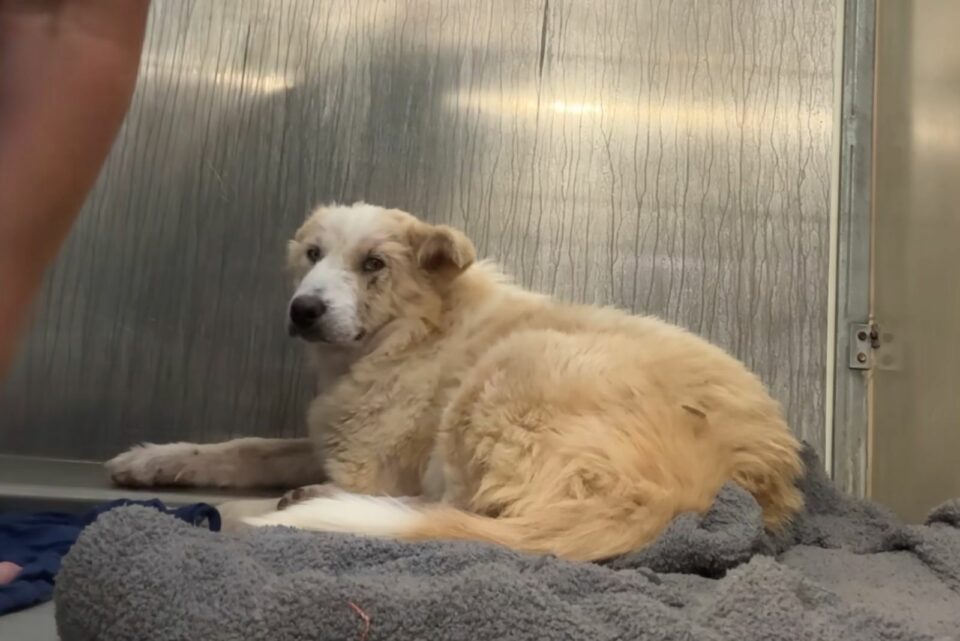
Just imagine what this girl went through when she shivers and shakes hiding in the corner. The world has betrayed her. Her humans have shattered her poor dog’s soul into pieces.
Katie was left deeply heartbroken, and she wasn’t even that old to go through it all.
At first glance, Katie seemed like a senior dog with all her terrible coat, slow and cautious movements, and pain in her eyes. However, when Rocky took another look, he realized this sweet girl was a young dog. At the time of her rescue, Katie was just a little over her first year of life.
She was in such a horrible condition!
A good Samaritan found Katie roaming the streets, searching for a way out of her terrible destiny. She had no ID tags. She wasn’t microchipped either. Katie was a nobody belonging to nobody. She was all alone.
When Rocky Kanaka, the famous pet rescue advocate, first saw Katie, he knew he needed a different approach with this dog. Anything could scare her and make her close into her little cocoon.
So, Rocky did what he does best: he sat down with the dog.
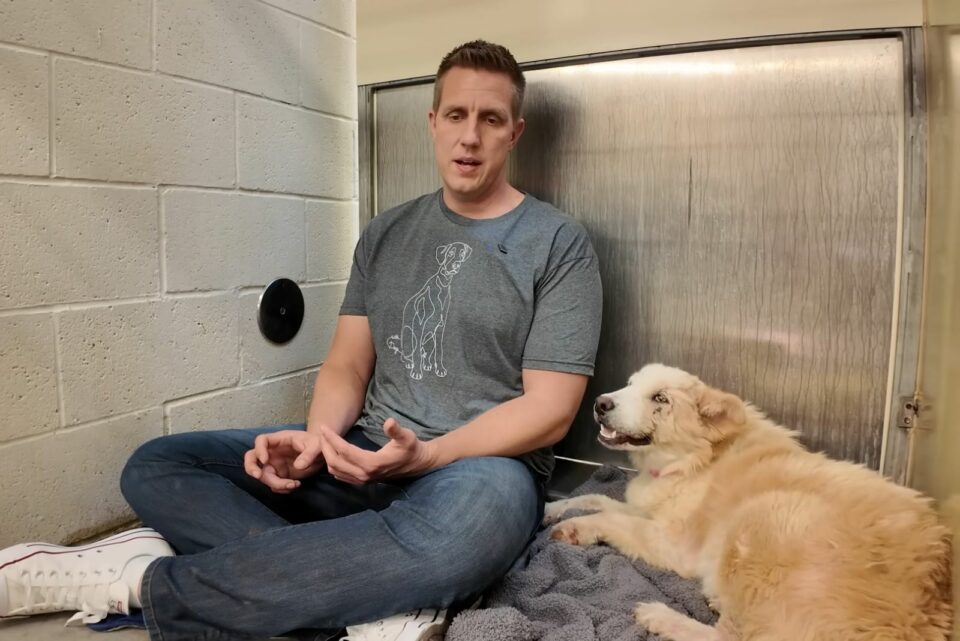
The next step was crucial. How do you build trust with a dog that doesn’t trust humans anymore?
Katie lost her faith in humanity a long time ago. Could it be restored with a simple gesture such as giving treats?
Of course, it can!
Rocky offered Katie some yummy treats, and she couldn’t say no. A person that hands out food just because can’t be bad.
“I’m here for you, and I’m not going anywhere,” said Rocky in his viral testimony.
And, he sat there next to Katie, handing out treat sticks and building trust one bite at a time.
It didn’t take too long for Katie to relax.
What’s That Incredible Sound?
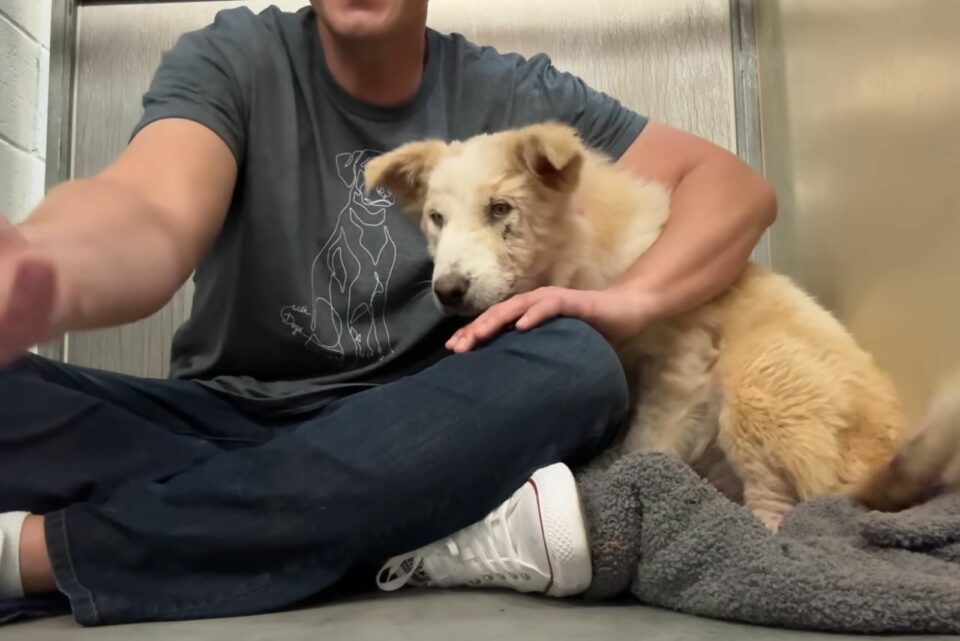
It was the sound of happiness! The sound of freedom and her new life.
Katie never heard such a lovely sound before.
Where does it come from? What was that?
And then… she saw it!
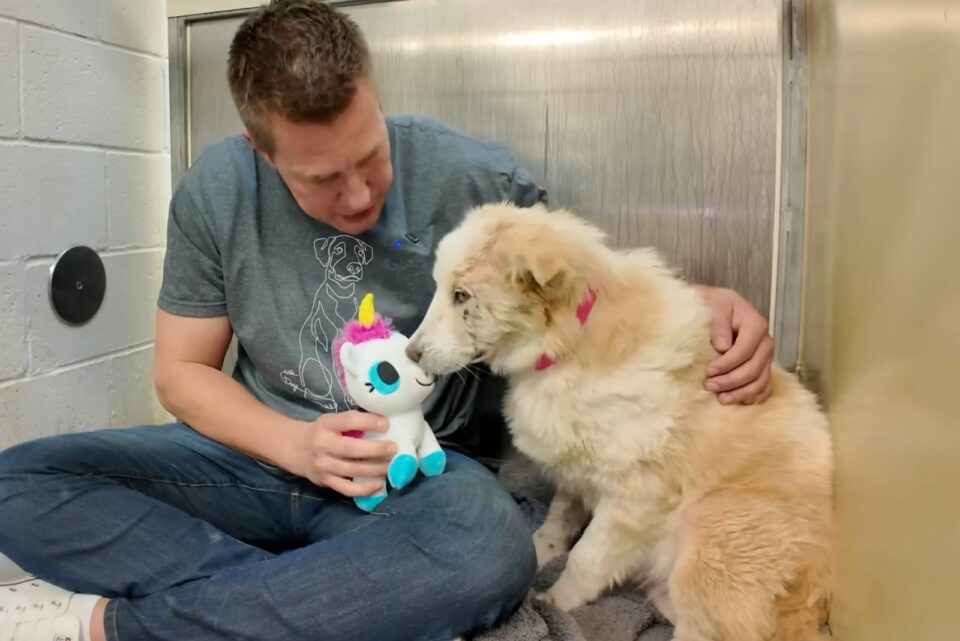
Her first toy!
Rocky asked the crew behind the camera to hand him the cutest unicorn toy that would be perfect for Katie.
As soon as he started squeaking it and showing it to Katie, she loved it. She was on cloud nine! An incredible amount of joy spread across her face, and Katie was a whole new dog in the blink of an eye.
That unicorn toy was probably her first one ever.
That unicorn toy woke up a pup inside her.
That unicorn toy told her everything’s gonna be different this time.
The Ultimate Sign Of Trust
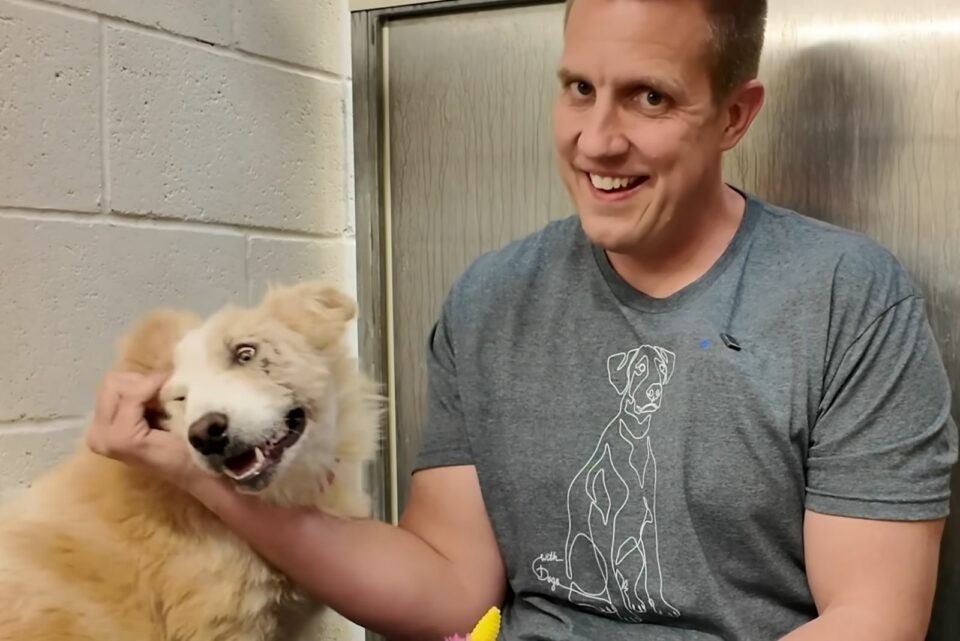
If you know at least a bit about dogs, then you know that approaching them and touching them physically is only possible when a dog trusts a human.
Dogs that are scared or don’t trust humans fully don’t allow anyone to come near them, let alone touch them.
Rocky felt it was the time to test Katie’s trust. He took a risk and tried scooping her up in his hands, lifting her from the ground. And, guess what? He succeeded!
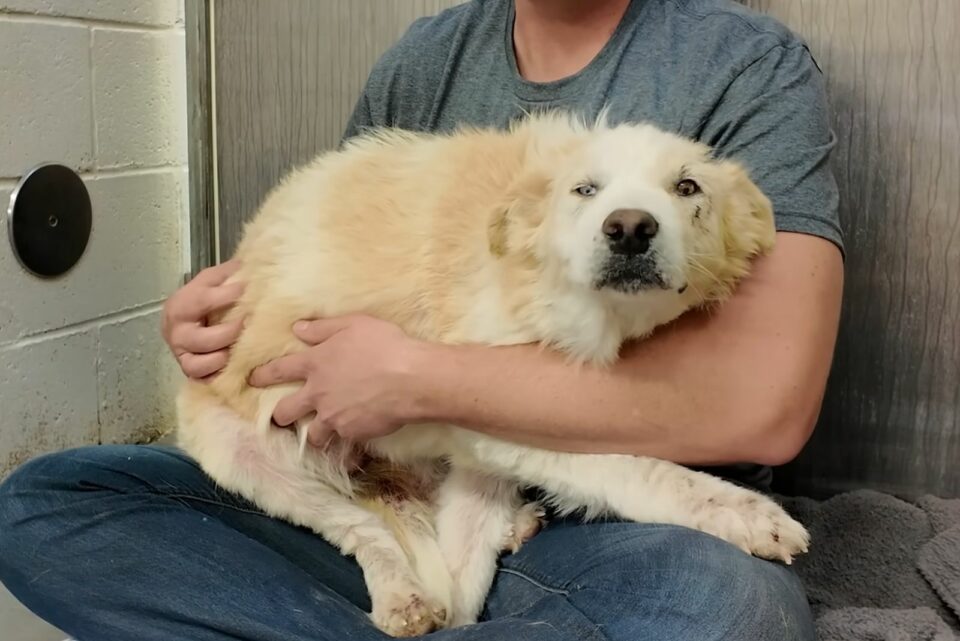
Rocky successfully picked up Katie, enjoying the moment because she showed that she trusted him. It was amazing!
A completely broken and estranged dog now doesn’t mind being picked up and cuddled. Katie’s transformation was fast.
This poor lost soul blossomed and gained a new friend, probably the first one in her life.
What The Future Holds For Katie
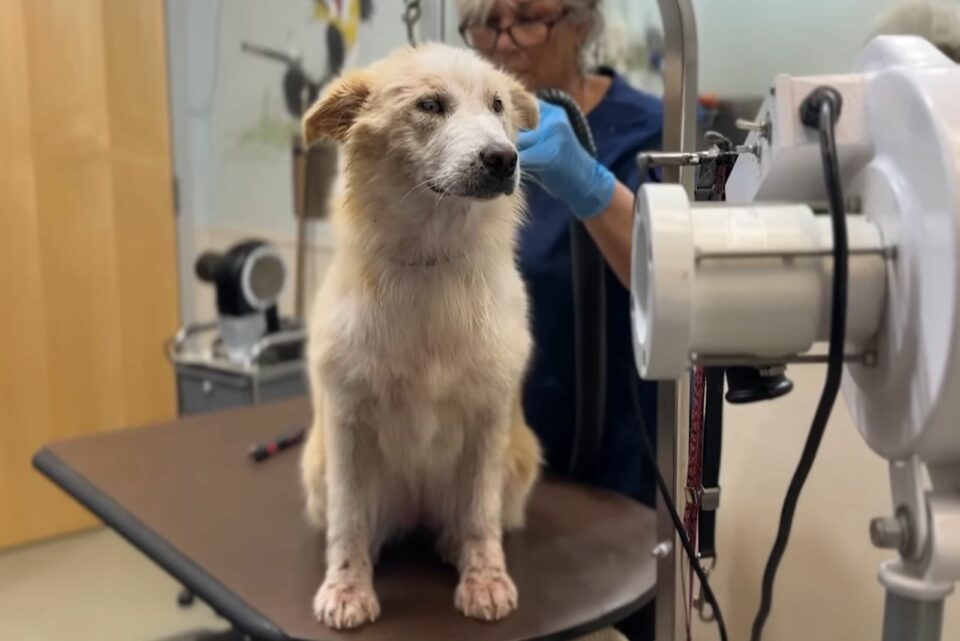
Katie, the sweet rescue girl, got a new name and a clean sleeve, all ready to find a furever hooman.
If we look past her scruffy coat and tired gait, Katie is a wonderful dog. Scars will heal, fur will grow back, and energy will return to her body. Katie will be a stunning dog in just a few months, and a little grooming session helped a lot with that.
I bet people will fight over her. I mean, wouldn’t you love to gaze into those gorgeous multicolored eyes every day? I know I would.
Katie is an enchantress. You’ll fall for her sweet looks and stay for her kindest temperament.
She could be a Husky mix or she could be an Aussie Shepherd crossbreed. Katie is definitely a unique pup you gotta meet.
Right now, Katie is still looking for a home. Rocky takes good care of her, making sure she really blossoms and shows us her sweet nature.
Reach out if you believe you could love Katie forever. I know she will love any good human being in return.
If you’ve noticed your furry companion sneezing more than usual, it might leave you wondering what’s going on in that adorable snout of theirs. Dogs, like humans, can experience sneezing for various reasons, and understanding the potential causes can help you ensure your pup’s well-being. Sneezing in dogs is a common occurrence that can range from harmless to needing a closer look.
When your four-legged friend starts sneezing, it could be due to simple reasons like dust or allergies, but sometimes it might signal an underlying issue that requires attention. As a responsible pet parent, being aware of the reasons behind your dog’s sneezing fits can help you provide the care and support they need to stay happy and healthy. So, let’s sniff out the possible reasons behind your dog’s sneezing episodes and how you can help them feel better.
Understanding Canine Sneezing
The Basics of a Sneeze
A dog sneezes just like you do. It’s a natural reflex that helps clear their nasal passages. Sneezing in dogs can be triggered by irritants like dust, pollen, or even playtime roughhousing. Remember, sneezing now and then is normal for your furry companion.
When Sneezing Is Normal
If your dog sneezes occasionally, especially after sniffing around or being in a dusty environment, it’s typically nothing to worry about. However, if sneezing becomes frequent or is accompanied by other symptoms like nasal discharge, coughing, or difficulty breathing, it might be time for a trip to the vet.
Common Causes of Frequent Sneezing in Dogs
Allergies and Irritants
If your dog is sneezing frequently, allergies and irritants could be the culprits. Just like people, dogs can have allergic reactions to various triggers like pollen, dust, mold, or certain foods. These allergens can lead to sneezing as your dog’s body tries to expel them from the respiratory system.
Nasal Infections and Mites
Frequent sneezing in dogs can also signal nasal infections or mite infestations. Infections caused by bacteria, viruses, or fungi can irritate the nasal passages, leading to increased sneezing. Additionally, mites like nasal mites can take up residence in your dog’s nasal cavity, causing discomfort and prompting frequent sneezing episodes.
Foreign Bodies and Obstructions
Another common reason for your dog’s frequent sneezing could be the presence of foreign bodies or obstructions in the nasal passages. Dogs are naturally curious creatures and may inhale small objects, plant material, or even insects, which can get stuck in their noses. These foreign bodies can trigger sneezing as your dog’s body tries to dislodge them.
When to Be Concerned About Your Dog’s Sneezing
Signs of a Serious Health Issue
If your dog’s sneezing persists or worsens, and is accompanied by nasal discharge, coughing, or labored breathing, it could indicate a more severe underlying health problem. Keep an eye out for these additional symptoms as they may signal the need for veterinary attention.
Chronic Sneezing and Health Implications
Chronic sneezing in dogs may lead to health complications if left untreated. Prolonged sneezing episodes could be a sign of chronic conditions like nasal infections, mite infestations, or even nasal tumors. It’s essential to monitor your dog’s sneezing patterns and seek professional help if the issue persists to ensure your furry friend’s well-being.
Diagnosing the Cause of Your Dog’s Sneezing
Veterinary Examination Procedures
When you take your dog to the vet for sneezing concerns, they’ll start by conducting a physical examination. The vet will check your dog’s nasal passages for any signs of inflammation, discharge, or obstructions. They may also examine your dog’s overall health to rule out underlying conditions that could be causing the sneezing.
Diagnostic Tests and What They Reveal
To determine the root cause of your dog’s sneezing, the vet may recommend diagnostic tests. These tests can include blood work, x-rays, and even nasal swabs to identify any infections, foreign objects, or tumors in the nasal passages. The results of these tests will help the vet tailor the treatment plan to address the specific issue causing your dog’s sneezing.
Treatment Options for a Sneezing Dog
Home Remedies and Management
When it comes to helping your sneezing dog at home, simple measures can make a difference. Keep your dog’s environment clean and free of potential irritants. Regularly dust and vacuum your home to reduce allergens. Ensure your dog has access to fresh, clean water at all times to stay hydrated. A humidifier can also help moisten the air, especially in dry climates, which can ease nasal irritation.
Medical Treatments and Procedures
If your dog’s sneezing persists or worsens, it’s essential to consult a veterinarian. Depending on the underlying cause, your vet may suggest treatments such as antihistamines for allergies, antibiotics for infections, or surgery for nasal obstructions. In some cases, corticosteroids may be prescribed to reduce inflammation. Diagnostic procedures like x-rays, blood tests, and nasal swabs may be necessary to determine the exact cause of your dog’s sneezing and tailor a specific treatment plan. Always follow your vet’s recommendations for the best outcome for your furry friend.
Preventing Future Sneezing Episodes
Environmental Management
To prevent future sneezing episodes in your furry friend, ensure to keep your living space clean and free from dust, pollen, and other potential allergens. Regularly dust and vacuum your home to minimize triggers that can irritate your dog’s nasal passages and lead to sneezing. Additionally, consider using an air purifier to improve air quality and reduce allergens that could be causing your dog to sneeze.
Regular Health Check-Ups and Vaccinations
Regular health check-ups and vaccinations are essential in maintaining your dog’s overall health and preventing potential illnesses that could lead to sneezing. Schedule routine visits to the veterinarian to ensure your dog is up to date on vaccinations and to catch any health issues early on. By staying proactive with your dog’s healthcare, you can help prevent future sneezing episodes and ensure your furry companion stays healthy and happy.
Conclusion
Now that you understand the various reasons why your dog might be sneezing, it’s essential to pay attention to any additional symptoms and seek veterinary advice if needed. Remember, keeping your dog’s environment clean, using a humidifier, and ensuring they stay hydrated can help alleviate sneezing. Medical treatments like antihistamines or antibiotics may be necessary, so don’t hesitate to consult your vet. By staying proactive with your dog’s health, you can prevent future sneezing episodes and ensure they lead a happy, healthy life.
Frequently Asked Questions
What are the common causes of sneezing in dogs?
Common causes of sneezing in dogs include allergies, irritants, infections, and obstructions in nasal passages. Monitoring symptoms like nasal discharge, coughing, or breathing difficulties is important.
When should I seek veterinary attention for my sneezing dog?
If your dog’s sneezing persists or worsens with additional symptoms like nasal discharge, coughing, or difficulty breathing, it’s crucial to seek veterinary attention promptly.
What are the treatment options for a sneezing dog?
Treatment options include home remedies like maintaining a clean environment, using a humidifier, and ensuring proper hydration. Veterinary treatments may include antihistamines for allergies, antibiotics for infections, or surgery for nasal obstructions.
How can diagnostic procedures help in treating a sneezing dog?
Diagnostic procedures like x-rays, blood tests, and nasal swabs can help determine the specific cause of a dog’s sneezing. This information allows veterinarians to tailor a treatment plan effectively.
What preventive measures can I take to avoid future sneezing episodes in my dog?
Preventive measures include managing the dog’s environment, keeping the living space clean, free from allergens, and using air purifiers. Regular health check-ups and vaccinations are also essential in maintaining overall health and preventing potential illnesses that could lead to sneezing.
[no_toc]

Hey there, I’m Janet Brooks, a dog-loving student from California. I’m all about helping pups in need, especially those without homes. Me and my awesome friends work together to give shelter and love to stray dogs. Oh, and I also write blogs about dogs to share helpful info.